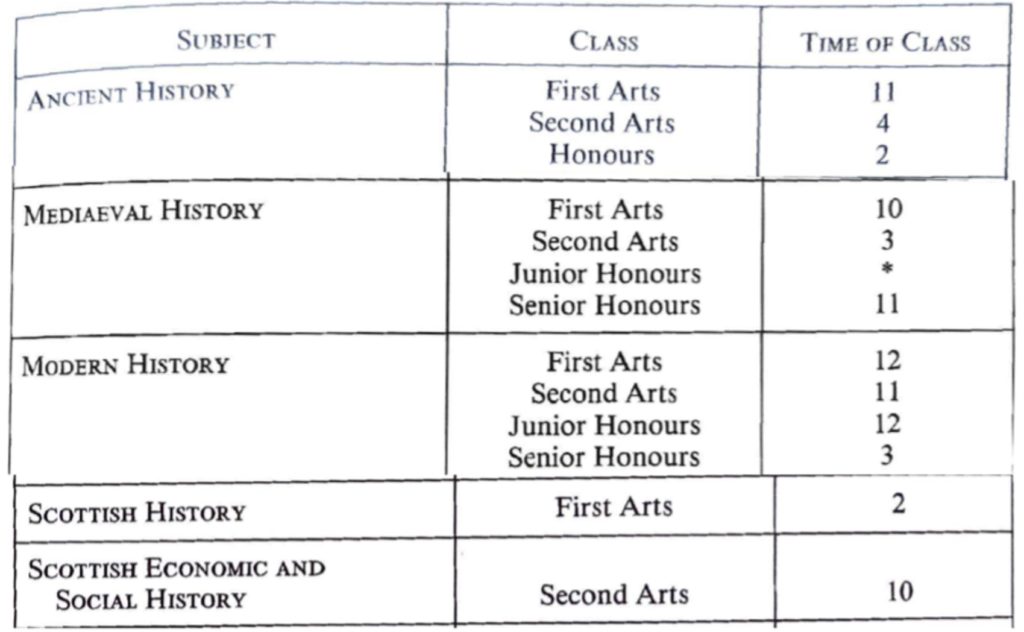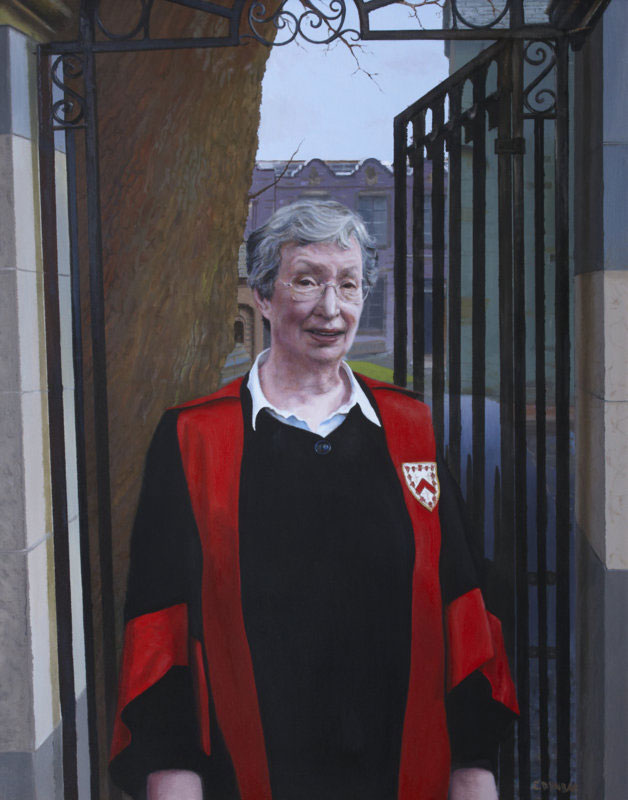Ann Kettle
Ann Kettle was a lecturer in the Department of Mediaeval History at St Andrews for more than forty years. In addition to her teaching and research, she held various administrative posts in the university. Beyond St Andrews, Ann has made substantial contributions as a campaigner, reviewer, evaluator, and consultant on higher education matters. The following account of her time spent at St Andrews has been drawn from an interview with her in 2021.
Ann Kettle was the first in her family to attend university. She read Modern History at the University of Oxford in the late 1950s, graduating in 1960. She continued with her studies at Oxford in a postgraduate research programme. At that time, however, universities like Oxford were “not organised for postgraduate research”. Indeed, Ann recalls seeing a supervisor on only three occasions over the course of her two years as a postgraduate student.
After her postgraduate studies, Ann secured a post as an Assistant Editor on the Victoria County History (VCH) of Staffordshire. Established at the end of Queen Victoria’s reign, the VCH is a national history series which strives to provide a historical account of each town and village in England, dating from prehistoric to contemporary times. Over the course of her time as Assistant Editor, Ann carried out varied research into the history of Staffordshire and describes her two years in the post as “an excellent training in being a historian”.
Ann had not been actively looking for a job in academia when she was appointed as a lecturer in the Department of Mediaeval History at St Andrews in 1964. It was, in fact, a friend of Ann’s who recommended that she apply for the opening at the university. Her friend had been a co-Fellow of All Souls College, Oxford with Lionel Butler, the first Professor of Mediaeval History at St Andrews. Ann’s appointment came during a period of significant expansion at St Andrews and Professor Butler was looking for a woman to fill one of the jobs that were available in the Department at that time. Unlike Ann Wright and Lorna Walker – two women who also joined the School of History as staff members in the 1960s – Ann’s route into academia did not stem from a wardenship appointment. Indeed, she was appointed simply as a lecturer.
Ann was required to teach at every level of the undergraduate degree as soon as she started. The “strength of the department” in those days, she remembers, was based “on tutorial work”, rather than just lectures. Indeed, tutorial groups looked very different then to what they do now. Groups consisted of four students in the General (first year) class; three in the Special (second year) class; two in junior honours; and, finally, one-to-one tutorials in senior honours classes. Ann found the teaching side of her work very interesting, although, as she recalls, there was no formal “teacher training” – it was simply a matter of “learning on the job”.

From the early days of her time at St Andrews, Ann remembers being given a certain amount of freedom with her teaching. Staff members were encouraged to develop new courses based upon what they were researching at the time. In the 1980s, for example, enough secondary source material became available for Ann to be able to introduce new courses on ‘Women in Mediaeval England’ and, later, on Christine de Pizan, the French poet and court writer. Ann’s decision to introduce such courses, however, were not welcomed by some of her colleagues in the department. She remembers, in fact, facing opposition from colleagues who “didn’t believe in social history and certainly didn’t believe that women had a history”. Ann did not, however, allow such objections to stand in her way and her courses proved very popular among students in the department.
In the vacations, Ann was also kept busy with research. Unusually, much of her research was commissioned and focused on economic and social history at the local level. Believing that “history should be useful”, Ann edited documents for publication by learned societies and wrote articles for the VCH on topics like monastic houses and agricultural history in the counties of Staffordshire, Cheshire, and Shropshire. At St Andrews, there was also a sabbatical scheme, which consisted of a term’s leave every seven years from teaching to pursue research. At one point, however, Ann recalls being explicitly denied study leave because a male colleague “needed it” to build his career.
Over the course of her long career at St Andrews, Ann witnessed many changes within the British university system, including the introduction of the Research Assessment Exercise (RAE, later REF) in 1986. Introduced under the premiership of Margaret Thatcher and in a period of budgetary restrictions within higher education, the RAE’s objective was to increase transparency in the allocation of research funding. Staff members were expected to produce four pieces of research each for the RAEs. Each university’s departmental quality was assessed by the University Grants Committee, which would then allocate research funding based upon a university’s ‘quality ranking’. In Ann’s opinion, the RAE was punitive rather than supportive of academic staff:
“Of course, quite quickly it became a game to be played…professors were bought in by transfer, like footballers. It was mostly men who were bought in and, of course, this affected the promotion opportunities for existing staff”.
Following the RAE’s introduction, more pressure began to be placed on the research productivity and quality of staff. This was made particularly clear to Ann when she served on appointment and promotion committees in the late 1990s and early 2000s. Presentations for teaching were required of candidates being interviewed for academic posts, but what was really important, she recalls, was the number of publications. The emphasis placed upon research productivity only increased inequality between men and women within academia. Indeed, although personally able to keep up with the demand for publications, Ann recalls that many women – particularly those with family responsibilities – “became targets for punitive action because they were not being productive enough”.
Ann was involved in many aspects of the University beyond teaching and research in the Department of Mediaeval History. She is, in fact, reluctant to define herself primarily and singularly as a ‘woman historian’. Reflecting upon her career, Ann recalls that the ‘glass ceiling’ metaphor was very much a stark reality for women historians at St Andrews in the late twentieth century:
“I was never going to get anywhere as a woman in history at St Andrews; I was never going to become a reader or a professor because there weren’t chairs in history for women in St Andrews…”.
As a historian, however, Ann had always been interested in finding out how institutions worked. She became increasingly involved in faculty and university administration. From 1991 until 1994, Ann served as Hebdomadar. Within that post, Ann was in charge of student welfare and discipline, which included managing resources like the student counselling service and the Access Fund for student hardship. From 1990 until 2001, Ann served as Chair of the Board of the Students’ Association; during that time, Ann was responsible for appointing a Welfare Officer within the Students’ Association, who was then appointed Director of Student Services when the post was taken over by the university.
In 1998, Ann was elected Dean of the Faculty of Arts at St Andrews, becoming only the second woman to be elected to this position in the University’s history. She assumed responsibility for the quality of teaching in departments, served on appointment and promotion committees, and was involved in all professorial appointments within the faculty.

Outside St Andrews, Ann was a trade union activist and was passionate about improving the position of women in academia through collective action. Through the local association of the Association of University Teacher’s (AUT), Ann negotiated with the university on issues ranging from equal opportunities to sexual harassment and consensual relations between staff and students. She also campaigned for giving women academics the choice to be appraised by other women and for the use of gender neutral language un university language. In 1984, she organized a Women’s Group to offer support and a forum for discussion of the challenges faced by female members of the academic and related staff.
One issue which was extremely important to Ann was the introduction of anonymous marking. Through an analysis of honours-level results within Mediaeval History, she was able to demonstrate the effects of introducing anonymous marking on the gender distribution of degree results. Before anonymous marking was introduced, two-thirds of male students achieved first or upper second-class degrees; after the introduction of anonymous marking, however, the position was reversed and two thirds of the women got firsts or upper second-class degrees.
On a national level, Ann chaired AUT’s National Women’s Committee and was elected President of the AUT in Scotland in the early 1990s. As a result of her trade union activism, she was appointed a member of the Scottish (Garrick) Committee of the National (Dearing) Committee of Enquiry into Higher Education in 1996. Published as the Dearing Report in 1997, the National Committee made a total of ninety-three recommendations regarding the future of higher education – the most significant of which was the introduction of tuition fees.
In 2004, Ann Kettle retired from lecturing at St Andrews – forty years after taking up the post and two years after being appointed an OBE for services to higher education. Following her retirement, Ann has continued research and publication in English local history and has worked as an reviewer, evaluator, and consultant in matters relating to higher education both in the United Kingdom and overseas. She remains an Honorary Senior Lecturer (latterly Professor!) at St Andrews.
This life history was written by Alyssa Shepherd. Ann was interviewed by Professor Frances Andrews of the School of History in early 2021.

I was delighted to read this and hear about Anne's many public -spirited activities and achievements, which have had gender equality as a guiding principle. I have served on the committee of WHS for many years and had not realised the full extent of her activities on behalf of women and equality more generally. A true role model.